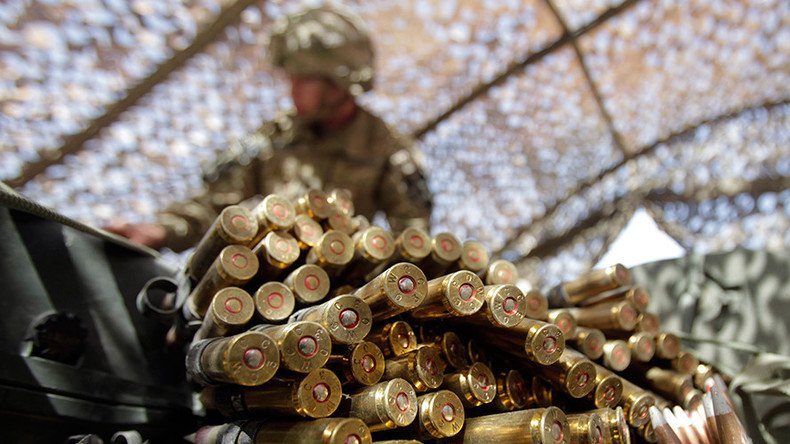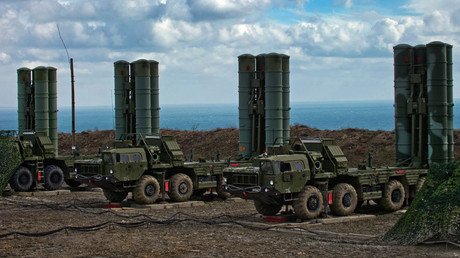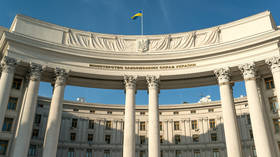US to obscure arms exports after Pentagon ‘pipeline’ to Syria exposed

The day after US President Trump’s barnstorming speech to the UN General Assembly decrying 'the scourge' of rogue states and terrorism, it was reported that his administration is set to greatly loosen American arms exports.
The trade in question is in the private sector of so-called “non-military weapons”. There seems little doubt that unleashing an already massive American export trade in private weapons will further fuel “the scourge” of conflicts and terrorism around the world.
What is also telling is the timing of the move by the Trump administration.
The move to boost exports of private American gun makers also follows an investigative report revealing a $2.2 billion arms pipeline run by the Pentagon and the CIA into Syria. Citing incriminating procurement papers, the explosive report shows how American government agencies are funneling assault rifles and rocket launchers, among other munitions, from Central and Eastern Europe into Syria to arm anti-government militant groups.
What the latest move by the Trump administration will do is obscure the potential paper trail of the weapons trade. In effect, the proposed change in US export regulations amounts to privatizing arms dealing.
As Reuters reported, the Trump administration wants to shift the responsibility for issuing export licenses for “non-military firearms” from the State Department to Commerce. The change could be implemented within the next months.
The volume of US privately manufactured weapons that are traded around the world is already huge. Last year, the State Department granted licenses for the export of $4 billion-worth of US-made small and medium arms. These weapons included handguns, assault rifles and even rocket launchers for the more adventurist gun enthusiasts.
Under the proposed Commerce Department’s purview the flow of arms overseas is expected to dramatically increase. That’s because Commerce has less restrictions than State on the risk of illicit weapons proliferation. Commerce is more driven by basic concerns to maximize trade and profit.
“There will be more leeway to do arms sales,” one senior administration official told Reuters. “You could really turn the spigot on if you do it the right way.”
The Trump administration is pushing for the regulatory change on the basis that it will boost America’s trade figures. “Buy American” is part of Trump’s plan to “make America great again”.
One key area to reduce the US trade deficit and supposedly give a fillip to American manufacturing jobs is to expand the export of “non-military” weapons.
Trump’s election campaign was bankrolled by the National Rifle Association to the tune of $30 million. Earlier this year, in April, he told an NRA convention: “I am going to come through for you.”
Some senior US lawmakers have expressed concern that the loosening of trade regulations will fuel conflicts overseas.
As Reuters reported: “Assault rifles like the Bushmaster would be some of the most powerful weapons expected to be more readily available for commercial export under the new rules.”
Democrat Senators Dianne Feinstein and Patrick Leahy reportedly wrote objections to US Secretary of State Rex Tillerson, pointing out that combat firearms are the “primary means of injury and destruction in civil and military conflicts throughout the world.”
However, the issue is about more than just callous indifference in the pursuit of profit. It is also about obscuring the potential links between US authorities and the arming of terrorist groups in the Middle East and elsewhere.
In the investigative report cited above, published earlier this month by the Balkans Investigative Reporters Network (BIRN), it confirms what many observers have been claiming for a long time. Namely, that the Pentagon and CIA have been covertly running a massive arms pipeline to militants in Syria to overthrow the Assad government.
According to the BIRN, the transfer of arms include Soviet-made assault rifles and rocket-propelled grenades. The arms were apparently scooped up from suppliers in Bosnia, Czech Republic, Poland, Germany, and elsewhere, and then shipped from Bulgaria and Romania to Turkey and Jordan before final destination in Syria.
The problem for the American authorities is that such industrial-scale trading leaves an embarrassing paper trail, from procurement documents to shipping contracts. The paper trail unearthed by BIRN clearly implicates the Pentagon’s Special Operations Command (SOCOM) and the CIA. The exposure compromises one of the main tenets of the CIA which is “plausible denial”. So serious are the findings of US gun running from Europe to the Middle East that the German authorities have been now reportedly forced to investigate.
The repercussions do not only concern Syria. It concerns any other country where American planners endeavor to covertly arm mercenaries for regime change or some other illicit function.
By shifting the responsibility for overseeing non-military arms exports from the State Department to Commerce, the Trump administration’s move potentially obscures federal government involvement in illicit arms trade. Rather than the Pentagon or CIA having to do paperwork for its ventures, the onus will be on private weapons companies and their private buyers overseas. That inevitably lessens the accountability of the US authorities when weapons end up fueling conflicts.
As noted, the American trade in non-military weapons is already substantial at an annual volume of $4 billion. Under Commerce’s looser regulations that trade figure is expected to jump by 15-20 per cent, according to Reuters.
One of the main importers of American private arms is Saudi Arabia. Which, as Hillary Clinton’s communications leaked by Wikileaks acknowledged, is accused of being the biggest sponsor of “Sunni extremist groups” operating globally.
The Trump administration appears to be primarily motivated by an unscrupulous objective of maximizing profits.
Syrian troops cross #Euphrates as they advance east of #DeirezZorhttps://t.co/yaZLqy7DN3pic.twitter.com/aH3giCWNwf
— RT (@RT_com) September 19, 2017
“Commerce wants more exports to help reduce the trade deficit. And State wants to stop things because it sees [arms] proliferation as inherently bad,” one of the US officials is quoted as saying. “We want to make a decision that prioritizes what’s more important,” he added, pointing to the need to get ahead of international arms competitors based in Europe.
But equally important, it would seem, is the erasing of connection between US authorities and “the scourge of terrorism”, which ironically President Trump admonished the UN General Assembly about earlier this week.
In effect, the Trump administration will make it easier for US weapons to end up in the hands of terror groups. What has been up to now the shady business of the Pentagon and CIA will henceforth become even more darkened through private networks of sellers and buyers.
The move is a corollary of how much of American military operations overseas have been privatized to security contract firms like Eric Prince’s Black Water. In Afghanistan and Iraq, for example, it is estimated that thousands of such private contractors have taken over the role formerly carried out by US troops. There are also suspicions that American-run mercenaries are active in Ukraine, Syria and Yemen. That privatization allows for Washington to dodge questions about its violation of international law.
Similarly, the deregulation of American arms trade involving private manufacturers allows for the Pentagon and the CIA to better invoke plausible denial when they are accused of sponsoring terrorist proxies.
It serves to show how Trump’s touted concern about terrorism at the UN was a cynical “hoax” – to use one of his favorite catchphrases.
The statements, views and opinions expressed in this column are solely those of the author and do not necessarily represent those of RT.















